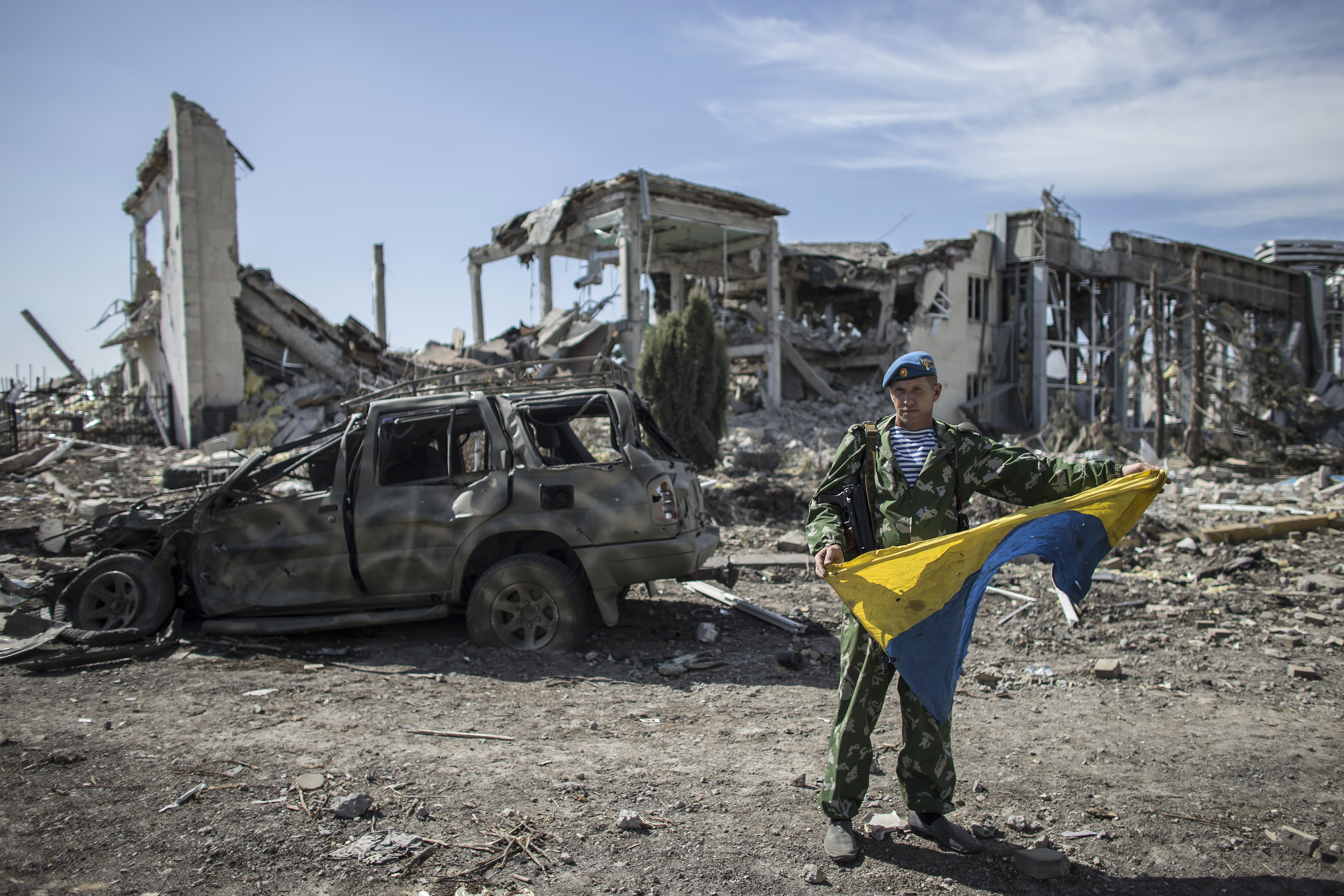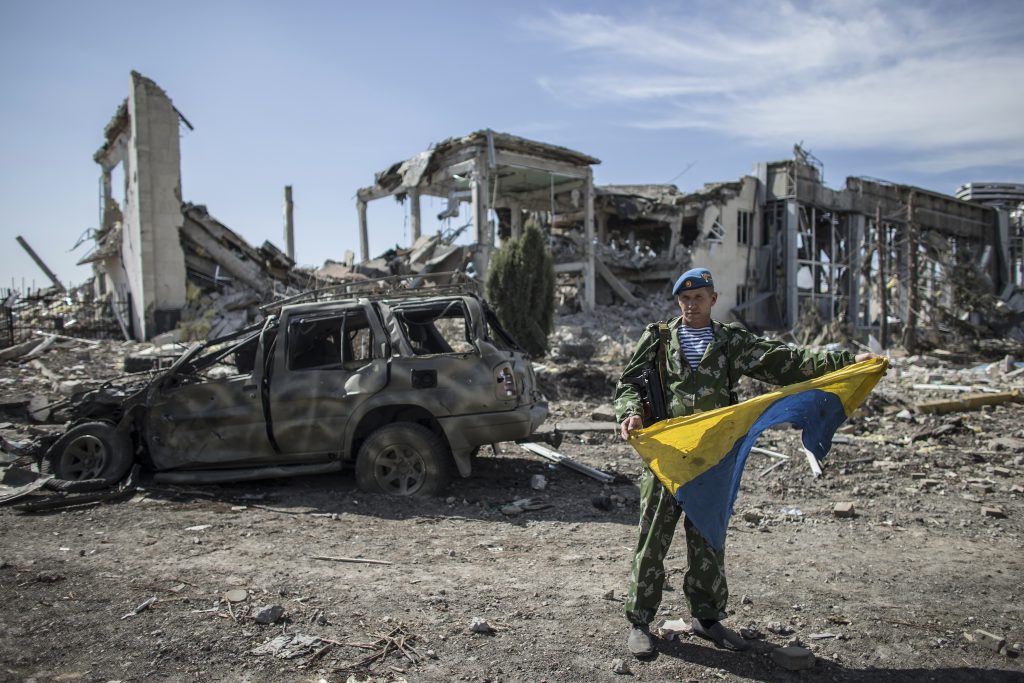
Kyiv Feels Little Supported by the West, Hopes to Survive an Unequal Ceasefire With Russia
KYIV
A junction of war and politics dominates public life in Ukraine as autumn settles firmly in Kyiv. An unequal cease-fire this month in southeast Ukraine will let Moscow maintain there a core of the invasion force it sent in last month. This has Ukraine’s political elite, feeling too-little-supported by the West, searching in disparate directions for a way to avoid the country’s further dismemberment.
But a deep distraction to that problem is domestic politics, specifically the sharpening campaign for parliamentary elections to be held in just thirty days. The obligatory patriotic rhetoric of national unity is not preventing politicians from seeking votes by working to marginalize even their like-minded rivals.
An Atlantic Council delegation visiting Kyiv over the past four days has seen these divisions and felt a heavy gloom in Ukrainians’ discussions of their predicament. Our team—former Undersecretary of State Paula Dobriansky, a Council board member; Senior Fellow Adrian Karatnycky; and myself—has met with nearly thirty-five senior government officials, politicians, business executives, and journalists.
While some of our interlocutors expressed appreciation for the latest round of (more rigorous) Western economic sanctions against Russia, most of them focused on the refusal of NATO states to provide weapons to help Ukraine defend against Russia’s intensified assault. President Barack Obama vowed to the United Nations General Assembly yesterday that “America and our allies will support the people of Ukraine as they develop their democracy and economy,” but as he has throughout the crisis, held short of promising any major help for Ukraine’s defense.
A good number of our interlocutors deemed President Poroshenko’s visit last week to Washington disappointing because he did not come back with weapons. The more canny observers here understood Poroshenko’s success in rallying support in Congress, but they also criticized him for a mixed message. While his speech to the Joint Session of Congress was a stirring call to defend Ukraine from Kremlin aggression, they said, his focus in Ukraine is the need for peace. Such talk does not prepare the Ukrainian people for the sacrifices that may well be needed to prevent further aggression by President Vladimir Putin’s government. Nor does it suggest that Russian forces and their proxies will face stiff resistance on the ground if they seek to move further into the country.
No Military Solution
Several observers with extensive national security experience criticized the Poroshenko government (and its predecessor, a fifteen-week interim administration) for moving too slowly back on February 27 to confront the first seizure by Russian-led troops (of Crimea’s legislature), and by not immediately activating the defense industry to produce arms for Ukraine’s military.
Despite the criticism, all understood that no military solution can restore Kyiv’s control over the parts of Luhansk and Donetsk provinces now controlled by Russia. Detailed provisions of the truce, announced last weekend, appear to have consolidated Russian tactical advantages, not least because Russia can avoid its demand for the withdrawal of foreign forces simply by continuing to deny the (independently demonstrated) presence of its troops and paramilitary fighters in Ukraine. And provisions for the pullback of heavy weapons from near the “line of contact” between the opposing forces do not apply to the Russian cannons, rockets and tanks sitting just across the border that turned the tide of the summer war against Ukraine.
Most of our interlocutors stressed that Ukraine now must concentrate its forces where Russian troops are gathering and might move next – toward the southern coastal cities of Mariupol (attacking from the east) or Kherson (moving north from Crimea). Those forces need weapons from the West to deter further Kremlin aggression.
No Clear Diplomatic Path
Observers associated with opposition political parties that are now seeking to represent the country’s east and south—parties being re-constituted from the political machine of the ousted former president, Viktor Yanukoych—suggested that Poroshenko should offer Russia a conciliatory diplomatic solution to “save President Putin’s face.”
No one criticized President Poroshenko for negotiating with the Kremlin, either at formal talks in the Belarusan capital, Minsk, or through backchannels. But many said the Minsk talks are stacked against Ukraine. The United States is absent, the Europeans present encourage Kyiv to make concessions to satisfy the Kremlin—and the formal mediator, the Organization for Security and Cooperation in Europe, is subject to a Russian veto on its actions.
The Minsk forum is seen in Kyiv as a mere sideshow to the real negotiations. Some acknowledged that the Minsk contact group can deal with small crises such as seizures of hostages or minor violations of the ceasefire. Any breakthrough, though, would come from covert talks that, Ukraine being Ukraine, are not well hidden. The frequent presence in Kyiv of Putin’s close aide, Vladislav Surkov, an architect of Russia’s use of military occupation to dominate its neighbors, is no secret to the city’s elite.
The Terms of a Deal?
According to some, elements of a prospective deal include: substantial decentralization by Ukraine of government power in eastern and southern provinces where Russia aims to increase its influence; the emergence of at least a strong, minority bloc sympathetic to Moscow in the parliament to be elected October 26; the appointment of a new prime minister not associated with last winter’s pro-democracy and pro-Europe Maidan movement. It is not clear whether these elements are acceptable to the Kremlin; like similar proposals floated this past summer in Europe, they are trial balloons designed to lock in concessions by the Ukrainian victim while allowing Moscow maximum flexibility.
It is clear, however, that these elements will not fly in today’s Ukraine. We heard from an authoritative pollster that in the wake of Kremlin aggression, polls consistently show that approximately 80 percent of the Ukrainian public disapprove of Putin. In Ukraine’s east (not including the Kremlin-controlled areas), this figure is only slightly lower.
President Poroshenko, in alliance with UDAR party leader and Kyiv Mayor Vitaliy Klitschko, is hoping to win a clear majority in the Rada elections. This will give him a free hand domestically to deal with the Kremlin presence in the Donbas, and to pursue economic reforms. Polls indicate that such a majority is possible, but not certain. Not surprisingly, his high approval rating of the early summer is dropping.
To enhance his electoral chances, Poroshenko has called his bloc the “Party of Peace.” He labels the rival Batkivshchyna Party of former Prime Minister Yuliya Tymoshenko, and the Civil Position party of former Defense Minister Anatoliy Hrytsenko, “Parties of War.” Tymoshenko and Hrytsenko return the favor by stressing the weaknesses of Poroshenko’s approach to Moscow.
Ironically, parties that were longtime supporters of the authoritarianism and corruption of the Yanukovych regime that helped lead Ukraine to this war, and which now are seeking votes among ethnic Russian voters of the south and east, also are highlighting their peace credentials. While Clausewitz may see war as politics by other means, in Ukraine war does not take a holiday from politics.
John E. Herbst is director of the Dinu Patriciu Eurasia Center at the Atlantic Council. He served as US ambassador to Ukraine from 2003 to 2006.
Image: A Russian army veteran and ex-paratrooper who gave his name as Yakut displays a captured Ukrainian flag at the destroyed airport in Luhansk, September 14. When Russia sent in paratroopers, tanks and artillery units in August, that counteroffensive stopped the advance of Ukrainian forces at Luhansk and in the adjacent province of Donetsk. (REUTERS/Marko Djurica)
